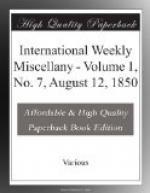with as diligent and faithful love as though the world
had never been purified and enriched by the treasures
of their feminine wisdom; yet this does not shake
our belief, that despite the spotless and well-earned
reputations they enjoyed, the homage they received,
(and it has its charm,) and even the blessed consciousness
of having contributed to the healthful recreation,
the improved morality, the diffusion of the best sort
of knowledge—the
woman would have
been happier had she continued enshrined in the privacy
of domestic love and domestic duty. She may not
think this at the commencement of her career; and at
its termination, if she has lived sufficiently long
to have descended, even gracefully, from her pedestal,
she may often recall the homage of the
past
to make up for its lack in the
present.
But so perfectly is woman constituted for the cares,
the affections, the duties—the blessed
duties of un-public life—that if she give
nature way it will whisper to her a text, that “celebrity
never added to the happiness of a true woman”.
She must look for her happiness to HOME. We would
have young women ponder over this, and watch carefully,
ere the veil is lifted, and the hard cruel eye of
public criticism fixed upon them. No profession
is pastime; still less so now than ever, when so many
people are “clever”, though so few are
great. We would pray those especially who direct
their thoughts to literature, to think of what they
have to say, and why they wish to say it; and above
all, to weigh what they may expect from a capricious
public, against the blessed shelter and pure harmonies
of private life.
But we have had some—and still have some—“celebrated”
women, of whom we have said “we may be justly
proud”. We have done pilgrimage to the
shrine of Lady Rachel Russell, who was so thoroughly
“domestic”, that the Corinthian beauty
of her character would never have been matter of history,
but for the wickedness of a bad king. We have
recorded the hours spent with Hannah More; the happy
days passed with, and the years invigorated by, the
advice and influence of Maria Edgworth. We might
recall the stern and faithful puritanism of Maria Jane
Jewsbury, and the Old World devotion of the true and
high-souled daughter of Israel—Grace Aguilar.
The mellow tones of Felicia Hemans’ poetry lingers
still among all who appreciate the holy sympathies
of religion and virtue. We could dwell long and
profitably on the enduring patience and lifelong labor
of Barbara Hofland, and steep a diamond in tears to
record the memories of L.E.L. We could,—alas!
alas! barely five and twenty years’ acquaintance
with literature and its ornaments, and the brilliant
catalogue is but a Memento Mori. Perhaps
of all this list, Maria Edgworth’s life was
the happiest: simply because she was the most
retired, the least exposed to the gaze and observation
of the world, the most occupied by loving duties toward
the most united circle of old and young we ever saw
assembled in one happy home.




